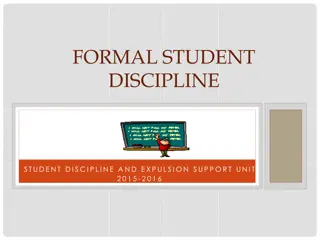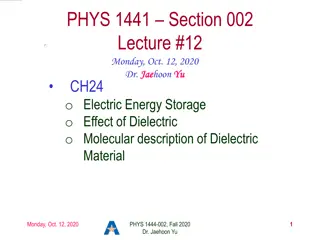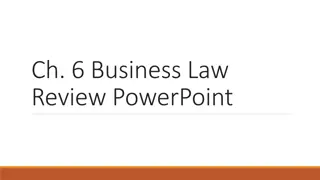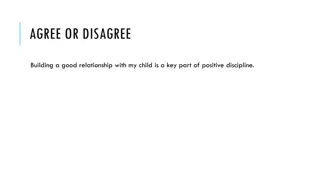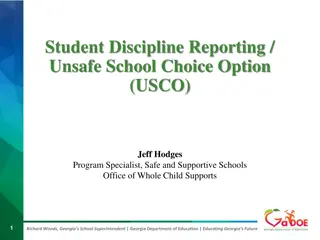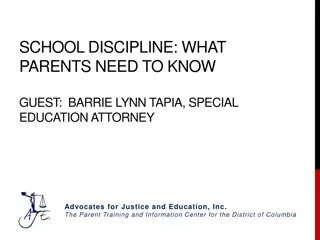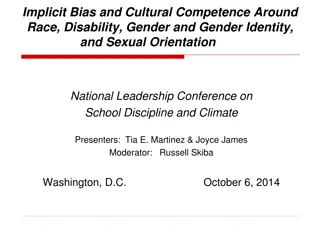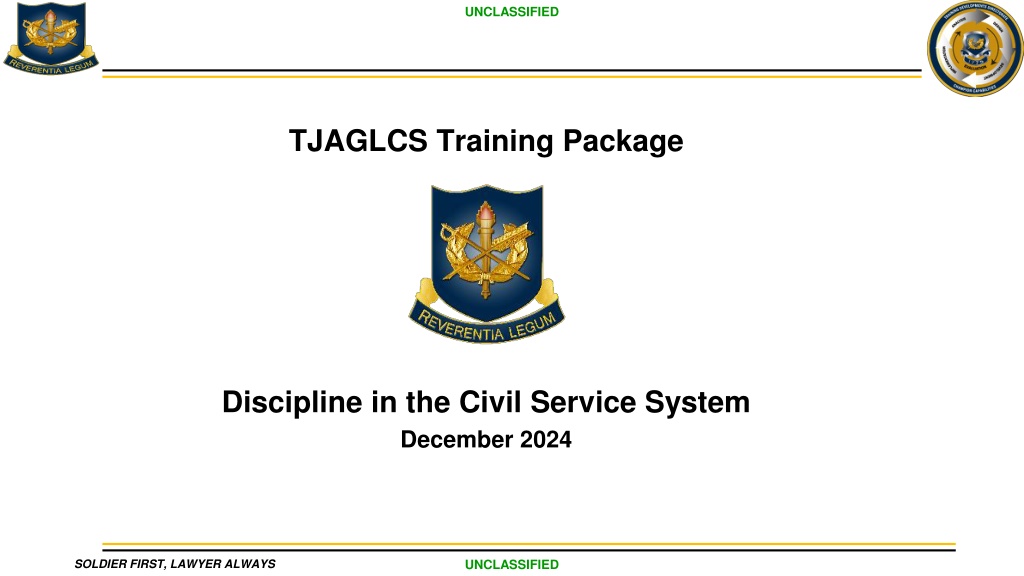
Keys to Civilian Employee Discipline Success
This training package provides essential information on disciplining civilian employees in the Civil Service System, emphasizing the importance of discipline for readiness and good order. Key points include the need for confidence in the disciplinary process, patience, attention to detail, team effort, and effective communication. Various disciplinary actions, performance standards, and the roles of management team members are highlighted to ensure successful civilian employee management.
Download Presentation

Please find below an Image/Link to download the presentation.
The content on the website is provided AS IS for your information and personal use only. It may not be sold, licensed, or shared on other websites without obtaining consent from the author. If you encounter any issues during the download, it is possible that the publisher has removed the file from their server.
You are allowed to download the files provided on this website for personal or commercial use, subject to the condition that they are used lawfully. All files are the property of their respective owners.
The content on the website is provided AS IS for your information and personal use only. It may not be sold, licensed, or shared on other websites without obtaining consent from the author.
E N D
Presentation Transcript
UNCLASSIFIED TJAGLCS Training Package Discipline in the Civil Service System December 2024 SOLDIER FIRST, LAWYER ALWAYS UNCLASSIFIED
UNCLASSIFIED The information provided throughout this training aid does not, and is not intended to, constitute legal advice; instead, all information, laws, statues, content, and materials for this training aid are for general informational purposes only. This training aid may not constitute the most up-to-date legal or other relevant legal information. Judge Advocates need to conduct their own due diligence through independent further legal research on any specific legal issue contained in this training package. No reader, user, or trainee of this product should act or refrain from acting based on information from this training aid without first seeking legal advice from an attorney in the relevant jurisdiction. SOLDIER FIRST, LAWYER ALWAYS UNCLASSIFIED 2
The Conventional Wisdom Disciplining civilian employees is: o Too hard o Takes too long o Is ineffective o Just cannot be done The reality: Civilian employee discipline is essential to readiness and good order and discipline BOTTOM LINE: YOU MUST BECOME CONFIDENT IN THE PROCESS
Keys to Success Keys to Success o Patience this is labor intensive (time consuming) o Attention to detail (documentation) o Team effort (support staff) o Effective communication Consistent, deliberate, transparent
Your Management Team Workers Compensation Specialist Manager / Supervisor Labor Counselor Civilian Human Resources Agency (CHRA) Labor Mgmt Employee Relations (LMER) Specialist Equal Employment Opportunity Manager Employee Assistance Program Counselor USALSA & DOJ Disability Program Manager
Performance / Misconduct Chapter 43 Chapter 43 Chapter 75 Chapter 75 Performance which fails to meet established performance standards in one or more critical elements of the employee s position Any type of behavior or action that adversely effects the efficiency of the service i.e. On or off duty misconduct, AWOL i.e. Performance Element 5 C.F.R. Part 752 5 C.F.R. Part 432
Chapter 43 Process Performance Deciding Official Issues Notice of Decision Employee Responds within 7 days Performance Improvement Plan (PIP) Issue Notice of Proposal Unacceptable performance Employee Fails Action Justification Appeal rights Element not met Summary of PIP Right to respond, representation, and appeal Notice and Opportunity to improve 12 months
Chapter 75 Process Misconduct/Generic Poor Performance Deciding Official Issues Notice of Decision Misconduct/ Generic Poor Performance Employee Responds within 7 days Issue Notice of Proposal Decision Justification Appeal rights Specific instances of poor performance/generic misconduct Right to respond/representation Appeal Rights
How to Decide on Punishment: The Douglas Factors All reasonable factors must be considered by the Deciding Official (appropriate penalty) A list of 12 factors including: o Nature & seriousness of offense o Past disciplinary & work record o Consistent penalty w/ (other employees)(Table of Penalties) o Properly put on notice o Rehabilitation potential o Mitigating circumstances Failure to consider could mean MSPB modifies penalty (Ch. 75 only) Failure to consider could mean MSPB modifies penalty (Ch. 75 only) Source: Douglas v. Veterans Administration, 5 M.S.P.R. 280, 305-306 (1981)
How to Decide on Punishment: The Table of Penalties Source: AR 690-752, Table 3-1, published 10 February 2022
Avoid Ward Violations: Provide Complete Notice Ward violation Ward violation: Employee lacks notice of new and material information that the Deciding Official relies upon Best practice Best practice: if Deciding Official becomes aware of new information, provide new notice to the employee
Progressive vs. Punitive Discipline Progressive Discipline (most cases) - select the least severe penalty necessary to correct behavior. Removal* Without duties or pay Reduction* Suspension 1-14 days OR 15 + days* Counseling, Warning, Reprimand *Appealable to MSPB Punitive Discipline - select most severe penalty warranted to deter future misconduct. 13
UNCLASSIFIED Need Training Materials? Have Training Materials? Questions? Contact Us! TJAGLCS-training@army.mil SOLDIER FIRST, LAWYER ALWAYS UNCLASSIFIED

![❤[PDF]⚡ Civil War Talks: Further Reminiscences of George S. Bernard and His Fel](/thumb/20551/pdf-civil-war-talks-further-reminiscences-of-george-s-bernard-and-his-fel.jpg)








